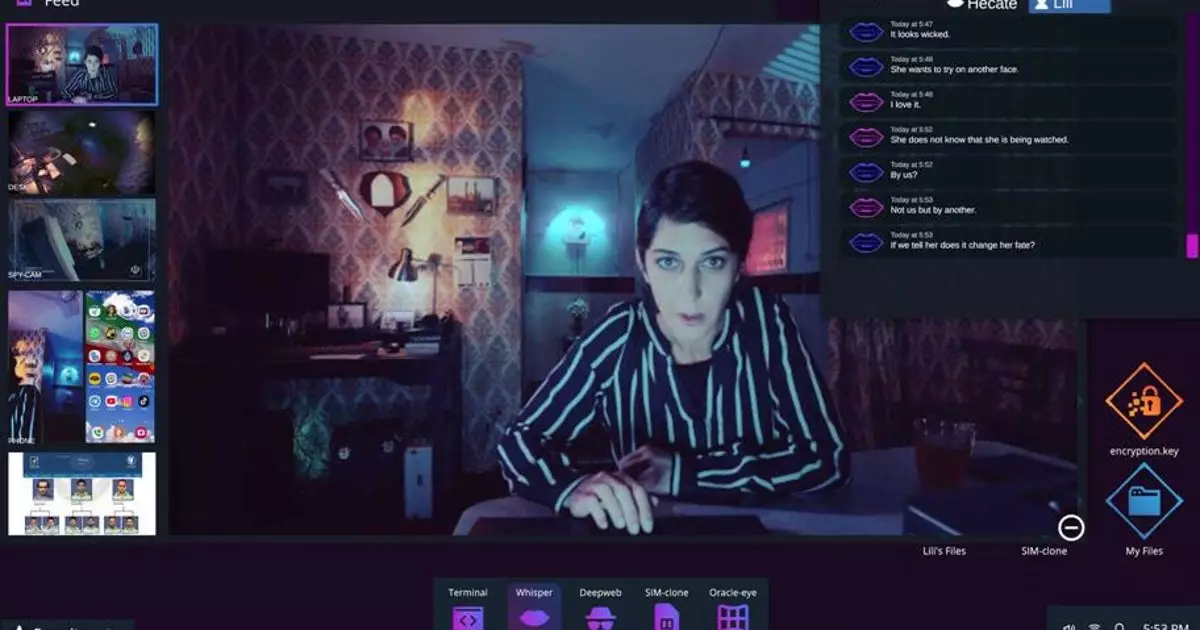In an unexpected but intriguing development, the Royal Shakespeare Company (RSC) is making a significant leap from the stage to the digital realm. Their latest project, “Lili,” promises to reimagine the infamous tragedy “Macbeth” through a contemporary lens, blending interactive gameplay with the themes of power and oppression. This project reflects a growing recognition among traditional artistic institutions that video games can offer new, innovative means to engage with classic literature. By transforming a well-known Shakespearean story into a playable digital experience, the RSC aims to attract a younger audience, tapping into the interactive narrative style popularized by contemporary game developers like Sam Barlow.
The premise of “Lili” is refreshingly innovative: players will delve into the life of Lady Macbeth by sifting through her digital footprint. Rather than the straightforward retelling of the original play, this adaptation grants players a unique perspective on her actions and motivations as they explore a contemporary Iranian setting. The game’s approach aligns with the trend of exploring social and political narratives through the lens of interactive fiction, allowing players to engage with critical themes like surveillance and authoritarianism in modern society.
The choice to reimagine the play in Iran is both daring and thought-provoking. The reality of the Iranian political landscape adds layers of meaning to the plot, infusing Shakespeare’s work with contemporary relevance. By featuring witches who have morphed into hackers and intertwining the story with elements of cyber-infiltration, the developers are set to disrupt conventional interpretations of the characters and their intentions.
Collaboration with Visionary Studios
The collaboration between the RSC and the New York-based studio, iNK Stories, is a well-considered partnership. Known for their work on “1979 Revolution: Black Friday,” a game that tackles themes around the Iranian Revolution, iNK Stories brings a wealth of experience in weaving narratives that highlight significant historical and cultural themes. This synergy promises a thoughtful and respectful adaptation that honors both the source material and the cultural context in which it is set.
Zar Amir, cast as Lady Macbeth, is another key asset to this ambitious project. Her previous work in the critically acclaimed film “Holy Spider,” where she portrayed an investigative journalist fighting against oppressive forces, indicates her capacity to bring depth and authenticity to this complex role. The RSC’s acknowledgment of Amir’s lived experience as an Iranian woman adds a vital layer of credibility and resonance to the character, making her insights pivotal in navigating the game’s narrative.
The development of “Lili” is noteworthy as it pioneers a genre that fuses the attributes of interactive drama with classic literary narratives. Traditionally, adaptations of Shakespeare’s work have largely remained confined to theatrical performances or films. However, by incorporating elements of gameplay into the storytelling, this project is positioning itself to redefine how audiences can experience and interact with Shakespeare’s texts.
The intersection of gaming and storytelling does not come without challenges. The creators will need to ensure that while they innovate, they also adhere to the artistic integrity of the original play. Maintaining a balance between engaging gameplay and the rich, poetic language of Shakespeare will be essential to resonate with both gamers and literary purists.
As anticipation builds for “Lili,” scheduled for production in late 2025, it is a moment of reflection for both the theatre and gaming communities. The RSC’s initiative represents a fresh potential for cross-disciplinary collaboration, showing that classical literature can find a new home within interactive media. It sets a precedent for future artistic projects that embrace innovation while championing the classics.
Ultimately, “Lili” reinforces the idea that storytelling continues to evolve and that the boundaries between different artistic forms are pliable. The dual influence of theatre and gaming in this project highlights a promising new horizon in the realm of storytelling, offering audiences a chance to engage with timeless themes in vibrant, modern contexts. As players step into Lady Macbeth’s world, they will find not just a retelling, but a reimagining that challenges their perceptions of agency, morality, and fate in an increasingly complex world.


Leave a Reply